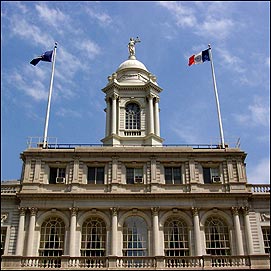 |
Last year, the New York City Council grappled with an issue whose advocates said went to the heart of religious and ethnic equality - the right to park a car.
Overriding a veto from Mayor Michael Bloomberg, the council voted to suspend alternate side of the street parking regulations on Asian Lunar New Year, Purim and Ash Wednesday, adding them to a list of two dozen other holidays when New Yorkers are not required to move their cars.
"It's about recognizing that Asian-Americans have contributed to the city," said Councilmember John Liu, chair of the transportation committee. "We should get the same level of respect and attention that everybody else gets."
In New York, transportation ranks among the top concerns of residents, after education and public safety, according to a survey by the New York City Council. And since taking office in 2002, the council has responded to voters concerns with a slew of transportation legislation.
To appease senior citizens who complained about reckless food deliverymen on bikes, the council made it illegal for anyone over the age of 14 to ride a bike on a New York City sidewalk.
When taxi cab drivers griped about excessive fines for burned-out hazard lights, the council passed a law allowing drivers to replace the bulb before police ticket them.
The council has even tried to increase the amount of space each person gets when walking down the street by giving communities more power in regulating sidewalk cafes and limiting the number of news racks on street corners.
In addition to these new laws, the City Council has also drafted, but has not yet passed, over a dozen other transportation related bills. Many of these bills are "quality of life" measures aimed at improving safety, making transportation more convenient, or reducing noise and pollution.
Here is an overview of some of the lesser-known pieces of transportation legislation still in committee.
TRANSPORTATION BILLS PENDING IN COMMITTEE
Pre-Tax Transit Benefits (Intro 481)
This legislation would require companies with more than 50 employees to offer pre-tax mass transit benefits. The council estimates that if the law passes, a commuter who buys monthly MetroCards could save $288 a year.
Truck Routes (Intro 344)
This bill would require truck drivers to carry a map of designated routes in an effort to prevent them from cutting through neighborhoods where they are not allowed to drive. Council members hope it will reduce noise, street damage and pollution, particularly in high traffic neighborhoods like the South Bronx.
Advisory Board of Drivers (Intro 195)
This legislation would create a 15-member advisory board for the Taxi and Limousine Commission, consisting of drivers, members of the public, owners, organizations advocating for drivers and agencies enforcing commission rules. The mayor and council members would appoint the members and supporters hope that the board would be a constructive way to address taxi issues in the city.
On Demand Taxis (Intro 267)
This bill would establish for-hire taxi stands in each borough. Local council members would suggest and approve the locations based on the proximity to mass transit, local taxi availability, traffic flow and public demand. This legislation aims to improve taxi service in the outer boroughs and diminish the need for illegal livery cabs.
Radios or Cell Phones on School Buses (Intro 16)
This measure would require all drivers who transport children to carry a two-way radio or cell phone at all times. Any person who does not comply will be fined no less than $1,000. Supporters say the bill would ensure that drivers could call for assistance and create safer transportation for children.
Traffic Signals and Schools (Intro 324)
This bill would require the Department of Transportation to install a stop sign or traffic signal at all intersections immediately adjacent to any New York City school.
Prohibiting Mobile Billboards (Intro 157)
This legislation would ban mobile billboards - the trucks or vans that troll city streets advertising movies, soft drinks or music CDs. Supporters argue that mobile billboards add congestion to the city streets, take up parking spaces, and block driver and pedestrians lines of sight.
Staten Island Ferry Service (Intro 56)
This bill would increase the Staten Island Ferry service by mandating a minimum operating schedule. The Staten Island council members who drafted the bill say it would ensure that commuters who are going home late from work still get adequate service. It would also protect ferry service from budget cuts.
Handicap Accessible Ferries (Intro 261)
This legislation would require all piers, ramps and water ferries to comply with American with Disabilities Act regulations. Currently, the majority of the ferryboats are handicap accessible, but many ramps and piers are not.
Sidewalk Damage (Intro 193)
This legislation would make property owners liable for any injury to property or personal injury, including death, caused by the failure of owners to maintain sidewalks in reasonably safe conditions. The purpose of the bill is to place liability for damage and injuries on the owner, not the city. In 2002, the city paid out $53 million in accident claims.




